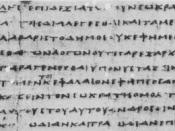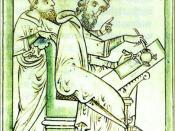God and The Good Itself
The Good Itself is, what Plato has called, the Divine. This never changing concept is the belief in something that it immortal. This immortality is something that, Plato states, we are all trying to achieve (102). Plato also says that in order for us, as reasonable human beings, to understand what is true and good, we must examine our lives (39). The examining one's life allows one to understand the Good Itself better, and thus living a more fulfilling life. Augustine extends the idea of the Good Itself into the existence of God. The most divine concept, according to Augustine, is God. It is God that is the most good, and it is according to this idea that we must direct our lives (354). Both philosophers state that the Divine is something that is unchanging and consistent. It lasts forever and never comes to be and passes away (104).
It is this idea that we are all trying to achieve, immortality. Nietzsche, on the other hand, believes that appealing to the eternal is to reject what is historical and real (1082). The Good Itself is just an idea or a concept. It won't help to explain what is real to human beings by explaining what is immortal and purely conceptual (1084).
Plato, with the use of Socrates' dialogues, explains that we are mortals seeking immortality. In the Symposium, Plato discusses the meaning of love by dividing it into what is called the Heavenly Ladder. This ladder of love leads to the "highest" love or rather the love that is most divine. It is the love of Beauty Itself, what is most good and true, that we seek to be ours (104). We desire what is most good because the soul will not want something...


